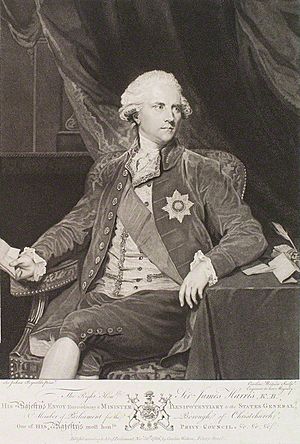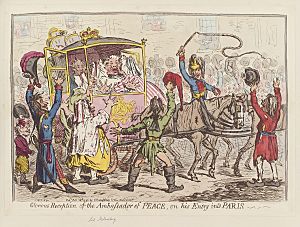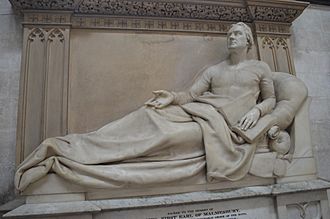James Harris, 1st Earl of Malmesbury facts for kids
Quick facts for kids
The Earl of Malmesbury
|
|
|---|---|

The Earl of Malmesbury
|
|
| Lord Lieutenant of Hampshire | |
| Earl of Malmesbury | |
| Monarch | George III |
| Preceded by | The Lord Bolton |
| Succeeded by | The Duke of Wellington |
| Personal details | |
| Born | 21 April 1746 Salisbury, Wiltshire, England |
| Died | 21 November 1820 (aged 74) |
| Spouse | Harriet Mary Amyand |
| Children | Lady Frances Harris Lady Catherine Harris James Harris, 2nd Earl of Malmesbury Rev. Hon. Thomas Alfred Harris |
James Harris, 1st Earl of Malmesbury (born April 21, 1746 – died November 21, 1820) was an important English diplomat. A diplomat is someone who represents their country in other nations. He worked to keep peace and good relationships between Britain and other European countries.
Contents
- Early Life and Education (1746 – 1768)
- Starting His Diplomatic Career in Spain (1768 – 1771)
- Envoy in Berlin, Prussia (1772 – 1776)
- Marriage and Family (1777)
- Envoy in St. Petersburg, Russia (1777 – 1783)
- Working in The Hague (1784 – 1788)
- Time Away from Diplomacy (1788 – 1793)
- During the French Revolutionary War (1793 – 1797)
- Later Life and Legacy (1798 – 1820)
Early Life and Education (1746 – 1768)
James Harris was born in Salisbury, England. His father, also named James Harris, was a Member of Parliament (MP) and a writer.
Young James went to Winchester College and then to Merton College, Oxford. He also studied Law and History at the University of Leiden in the Netherlands from 1765 to 1767.
Starting His Diplomatic Career in Spain (1768 – 1771)
In December 1768, Harris arrived in Madrid, Spain. He became the secretary for the British embassy there. When the main ambassador left, Harris took over as the chargé d'affaires. This meant he was in charge of the embassy for a short time.
During this period, he found out that Spain planned to attack the Falkland Islands. He bravely helped stop this attack. Because of his good work, he was made the temporary minister in Madrid.
Envoy in Berlin, Prussia (1772 – 1776)
In January 1772, Harris became the special envoy to Prussia in Berlin. He arrived on February 21. Soon after, he learned about Frederick the Great's plan to divide Poland with Russia.
Even though his time in Berlin was not very famous, Frederick the Great was impressed by him. Frederick even asked for Harris to be reappointed to his post.
Marriage and Family (1777)
In 1777, James Harris married Harriet Maria Amyand. She was the youngest daughter of Sir George Amyand.
James and Harriet had four children:
- Lady Frances Harris
- Lady Catherine Harris
- James Edward Harris, who later became the 2nd Earl of Malmesbury
- The Reverend Thomas Alfred Harris
Envoy in St. Petersburg, Russia (1777 – 1783)
In the autumn of 1777, Harris traveled to St Petersburg, Russia. He served as the special envoy there until September 1783. This is where he became very well-known.
He managed to get along with Catherine the Great, even though she preferred France. He also skillfully handled difficult situations, like the first Armed Neutrality. In 1778, he was made a Knight of the Bath. This is a special honor given by the British monarch.
In 1782, he returned home due to poor health. He was then appointed minister to The Hague in the Netherlands.
Working in The Hague (1784 – 1788)
In The Hague, Harris did a great job helping Britain's foreign policy. He worked to keep England's influence strong in Europe. He played a key role in helping the King of Prussia overthrow the French-leaning Patriot party in the Dutch Republic. This helped bring back the stadtholder William V, Prince of Orange to power.
Harris became very involved in Dutch politics. He worked as the unofficial leader of the Orangist party, which supported the stadtholder. He used secret agents and spies to help his goals.
In 1787, he convinced the British government to support his efforts with money. This money was used to influence parts of the Dutch army. These actions led to a political crisis. It also gave Prussia and Great Britain a reason to get involved militarily.
For his services, he was given the title Baron Malmesbury in 1788. He was also allowed to use the Prussian eagle on his family crest. The Prince of Orange let him use his motto, "Je maintiendrai" (meaning "I will maintain").
Harris believed that France was a rival power that Britain could not trust. He thought France was always trying to destroy England. Historians say he was a very effective diplomat.
Time Away from Diplomacy (1788 – 1793)
After his time in The Hague, he returned to England. He was interested in politics. In 1793, he left the Whig political party.
During the French Revolutionary War (1793 – 1797)
In 1793, Prime Minister William Pitt sent Harris to Prussia. He tried to keep Prussia allied with Britain against France, but it was unsuccessful.
In 1794, he was sent to Brunswick to arrange the marriage of Princess Caroline to the Prince of Wales. He acted as a stand-in for the Prince during the marriage ceremony. He then brought her to England. However, he did not warn the Prince about Caroline's unusual behavior. The Prince was very shocked when he met her.
Peace Missions to France

In 1796 and 1797, he went to Paris and then to Lille. He tried to negotiate peace with the French government. However, these talks were not successful.
Because of bad roads, it took Malmesbury a week to reach Paris in 1796. This led some people to joke that he was moving slowly because he was "on his knees" begging for peace.
Later Life and Legacy (1798 – 1820)
After 1797, James Harris became partly deaf. He stopped working as a diplomat. But for his long and important service, he was given the title Earl of Malmesbury in 1800.
He became a trusted advisor on foreign policy. Many foreign ministers asked for his advice. Younger politicians, like Lord Palmerston, also looked up to him. Lord Palmerston learned many of his ideas about foreign policy from Harris.
In his later years, he lived quietly. He passed away on November 21, 1820. His monument can be found in Salisbury Cathedral.
Historians consider Malmesbury one of the greatest English diplomats of the 18th century. He helped make diplomacy a respected career for talented people, not just for nobles.
Malmesbury believed that France was Britain's "natural enemy." He also said that England often fought for its allies and to keep a balance of power in Europe.
He did not publish many of his own writings. However, his important Diaries and Letters were published by his grandson.
He was also a Member of Parliament for Christchurch from 1770 to 1774 and from 1780 to 1788.
 | William M. Jackson |
 | Juan E. Gilbert |
 | Neil deGrasse Tyson |


